|
|
|
Sort Order |
|
|
|
Items / Page
|
|
|
|
|
|
|
| Srl | Item |
| 1 |
ID:
152739
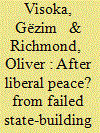

|
|
|
|
|
| Summary/Abstract |
Attempts to build a liberal peace and a concurrent neoliberal state in Kosovo have not managed to produce a sustainable and emancipatory peace. Instead, they have produced a local and negative hybrid peace that has been co-opted by the dynamics of local state formation and state contestation. These dynamics have overshadowed a meaningful transition from ethnic hostility to sustainable peace that should encompass pluralism, security, law, rights, and liberal institutions. This article examines this emergence of a negative hybrid peace and explores the prospects for a more emancipatory peace based on a local pro-peace infrastructure that avoids the pitfalls of liberal peace in practice.
|
|
|
|
|
|
|
|
|
|
|
|
|
|
|
|
| 2 |
ID:
157988
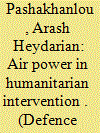

|
|
|
|
|
| Summary/Abstract |
It would be hard to overstate the importance of air power in humanitarian intervention (HI) and the Responsibility to Protect (R2P). Yet, the role of air power in HI and R2P has been understudied. This article seeks to remedy the lack of systematic investigation. It does so by developing a framework for assessing the effectiveness of air power during military operations in HI and R2P and applies it to NATO’s air campaigns in Kosovo (Operation Allied Force) and Libya (Operation Unified Protector). Upon examination NATO is revealed to have fared better in Libya than Kosovo in positively accomplishing its stated humanitarian objectives, minimizing collateral damage and reducing the costs for the interveners, all of which are aspects considered by the model. The relative effectiveness of Operations Unified Protector is generally attributed to geography, diplomacy and technology. It is argued that better ground support, unmanned aerial vehicles (UAVs) and burden sharing are needed to enhance the utility of air power in HI and R2P even further.
|
|
|
|
|
|
|
|
|
|
|
|
|
|
|
|
| 3 |
ID:
130239


|
|
|
|
|
| Publication |
2014.
|
| Summary/Abstract |
Almost every war that America has fought since the beginning of the twentieth century was a war America had determined to avoid. We were neutral in World War I?.?.?.?until unlimited submarine warfare against our trans-Atlantic shipping became intolerable. We resisted entering World War II until Pearl Harbor. We defined the Korean peninsula as lying outside our "defense perimeter," as our secretary of state declared in 1950, a few months before North Korea attacked South Korea and we leapt into the fray. A few years later, we rebuffed French appeals for support in Vietnam in order to avoid involving ourselves in that distant country which was soon to become the venue of our longest war and greatest defeat. In 1990, our ambassador to Iraq explained to Saddam Hussein that Washington had "no opinion on?.?.?.?your border disagreement with Kuwait," which he took as encouragement to swallow his small neighbor, forcing a half million Americans to travel around the world to force him to disgorge it. A year after that, our secretary of state quipped about the violent disintegration of Yugoslavia that "we have no dog in that fight," a sentiment echoed by his successor, of the opposite party, who, demonstrating his virtuosity at geography, observed that that country was "a long way from home" in a place where we lacked "vital interests"-all this not long before we sent our air force to bomb Serbia into ceasing its attacks on Bosnia and then bombed it again a few years later until it coughed up Kosovo.
|
|
|
|
|
|
|
|
|
|
|
|
|
|
|
|
| 4 |
ID:
079471
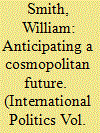

|
|
|
|
|
| Publication |
2007.
|
| Summary/Abstract |
The past decade has witnessed the emergence of numerous 'cosmopolitan' theories of humanitarian military intervention. These theories anticipate a more cosmopolitan future, where interventions will be authorized by new cosmopolitan institutions and carried out by reformed cosmopolitan militaries. The contention of my article is that despite the merits of these approaches, it is often difficult to discern whether and how cosmopolitan theories can inform assessments of interventions that take place in our non-cosmopolitan present. Through taking Jürgen Habermas's judgements of two recent interventions as a 'case study', I reflect on the considerations that might come into play when cosmopolitans attempt to translate their future-orientated theories into practical engagements with the world as it
|
|
|
|
|
|
|
|
|
|
|
|
|
|
|
|
| 5 |
ID:
068279
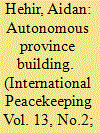

|
|
|
| 6 |
ID:
059034
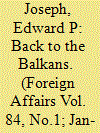

|
|
|
|
|
| Publication |
Jan-Feb 2005.
|
| Summary/Abstract |
Since Slobodan Milosevic was sent to The Hague two years ago, the former Yugoslavia has dropped off the international radar. But the Balkans are far from secure: corruption runs rampant, economies are flat, and ethnic hatred continues to simmer. Worst of all, Kosovo remains a flashpoint that could re-ignite the region.
|
|
|
|
|
|
|
|
|
|
|
|
|
|
|
|
| 7 |
ID:
007277


|
|
|
|
|
| Publication |
Autumn 2000.
|
| Description |
177-192
|
|
|
|
|
|
|
|
|
|
|
|
|
|
|
|
| 8 |
ID:
107148
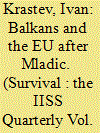

|
|
|
|
|
| Publication |
2011.
|
| Summary/Abstract |
Ten years after the last war in the region, the Balkans is still an assemblage of frustrated protectorates and weak states. Bosnia and Kosovo are trapped in the labyrinthine politics of semi-independence; Albania, Macedonia and Montenegro are small and claustrophobic republics with populist and divisive governments and opposition forces that are discouraged and discouraging at the same time. Serbia has not yet made up its mind how to reconcile its position on Kosovo with its aspiration to join the European Union. Croatia has succeeded in its accession talks with the EU, which closed on 30 June 2011, but the mood of the public is dire due to mismanagement and corruption scandals. The Balkans currently reflects a mixture of Greek-style economic problems, Berlusconi-style politics and Turkish-level hopes when it comes to joining the EU. With Italy and Greece facing deep political and economic troubles of their own, the Balkans has lost its natural advocates for EU membership.
|
|
|
|
|
|
|
|
|
|
|
|
|
|
|
|
| 9 |
ID:
047352
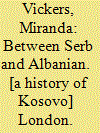

|
|
|
|
|
| Publication |
London, Hurst and Company, 1998.
|
| Description |
xix, 328p.pbk
|
| Standard Number |
1850653585
|
|
|
|
|
|
|
|
|
|
|
|
Copies: C:1/I:0,R:0,Q:0
Circulation
| Accession# | Call# | Current Location | Status | Policy | Location |
| 044857 | 949.71/VIC 044857 | Main | On Shelf | General | |
|
|
|
|
| 10 |
ID:
105189
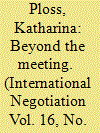

|
|
|
|
|
| Publication |
2011.
|
| Summary/Abstract |
Intercommunity dialogue encounters are a crucial tool for constructive conflict resolution. This research examines grassroots dialogue encounters with regard to the societal position of the participants, as well the situation `on the ground' as influential to the transfer process. Interviews in Northern Ireland and Kosovo with community activists stressed the effectiveness of personal characteristics of dialogue participants when it came to transfer. Moreover, the readiness - affected by socio-economic conditions as well as external/secondary conflict parties - of the peer group to listen to its participant seemed fundamental.
|
|
|
|
|
|
|
|
|
|
|
|
|
|
|
|
| 11 |
ID:
108115
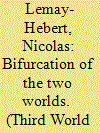

|
|
|
|
|
| Publication |
2011.
|
| Summary/Abstract |
Studies increasingly highlight the limits of state building conducted 'from the top-down'. Building on the literature and using a Rosenauian concept in a novel way, this article posits that international interventions create a 'bifurcation of the two worlds'. Departing from a study of Kosovo and Timor-Leste, the article posits that the massive arrival of staff involved in international governance will create a social gap between the international and the local 'worlds', which will in turn become a target of narratives of resistance by local actors. This bifurcation is exemplified by the 'white car syndrome', a concept representing the horde of white UN vehicles accompanying major interventions and developed in this contribution. Thus, the article attempts to shed new light on the legitimacy crises that Kosovo and Timor-Leste experienced at the beginning of the current century, while demonstrating and increasing the linkages between development studies and peace studies.
|
|
|
|
|
|
|
|
|
|
|
|
|
|
|
|
| 12 |
ID:
098357
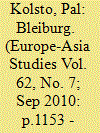

|
|
|
|
|
| Publication |
2010.
|
| Summary/Abstract |
In a study of historical myths in South Eastern Europe in 2005 I identified four different types of mythologies, one of which was the myth of martyrdom (Kolsto 2005). I pointed out that while nations most of the time celebrate their victories and moments of glory, occasionally their great tragedies and defeats are also embellished into mythical stories and made into objects of collective commemoration. As a prime example of mythologised defeats in the history of the Balkan peoples I-like many other authors-singled out the battle of Kosovo in 1389, an event which in contemporary Serbian consciousness has come to be regarded as the moment when the Serb nation chose righteousness and truth over earthly power (Vuchinich & Emmert 1991; Anzulovic 1999, pp. 11-22; Judah 2000).
|
|
|
|
|
|
|
|
|
|
|
|
|
|
|
|
| 13 |
ID:
103531
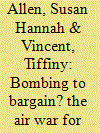

|
|
|
|
|
| Publication |
2011.
|
| Summary/Abstract |
Given the prominence of air power as a foreign policy tool, we attempt to clearly link the military process of dropping munitions on the target state to the accompanying diplomatic process between the attacker and the adversary. To explore the connection between the two processes, we look at the 1999 NATO bombing campaign over Kosovo, which allows us to isolate the influence of air power. Why were 78 days of NATO bombing needed to convince Miloševic to make concessions? Comparing expectations from both bargaining models and traditional coercive models, we find that the intensity of bombing, the duration of bombing, and mediation were important predictors of the Serbian government's behavior during the Kosovo crisis.
|
|
|
|
|
|
|
|
|
|
|
|
|
|
|
|
| 14 |
ID:
094725
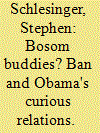

|
|
|
| 15 |
ID:
104323
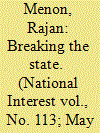

|
|
|
|
|
| Publication |
2011.
|
| Summary/Abstract |
THE MIDDLE East roils and one fact is certain: interventions end badly. For intervention leads to postwar reconstruction and postwar reconstruction leads to failure.
|
|
|
|
|
|
|
|
|
|
|
|
|
|
|
|
| 16 |
ID:
167188
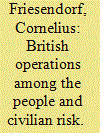

|
|
|
|
|
| Summary/Abstract |
Debates on military intervention and small wars often include the claim that soldiers should operate among civilians in order to avoid civilian casualties and to protect civilians against third-party violence. This article, by contrast, points at negative unintended consequences of military operations taking place in close proximity to local populations: it argues that also risk-tolerant militaries cause civilian casualties and that their presence triggers third-party violence against civilians. The British military, in particular the British Army, exported risk-tolerant practices from Northern Ireland to the Balkans, with sporadic success. But in southern Iraq and in Helmand, British ground operations harmed civilians. The findings suggest that the chances for protection are better in operations where levels of violence are relatively low than in counterinsurgency where troops face ruthless and well-endowed enemies operating among civilians.
|
|
|
|
|
|
|
|
|
|
|
|
|
|
|
|
| 17 |
ID:
176286
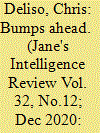

|
|
|
| 18 |
ID:
174097
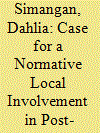

|
|
|
|
|
| Summary/Abstract |
Liberal peacebuilding’s imperfect record of involving local actors in rebuilding post-conflict societies paved the way for the local turn in peacebuilding. One of the issues the local turn highlights is local involvement in peacebuilding processes. Drawing from the experiences of previous peacebuilding missions in Cambodia, Kosovo, and Timor-Leste, this paper contributes to the local turn by identifying the types of local involvement in peacebuilding and their consequences on post-conflict societies. This identification could be useful in steering the local turn away from the same flawed local involvement that brought liberal peacebuilding into crisis. The analysis in this paper demonstrates how exclusive, superficial, non-representative, and politicized types of local involvement failed to achieve or sustain peace in Cambodia, Kosovo, and Timor-Leste. The conflict-promoting tendencies of these types of local involvement make a case for a normative agenda that is inclusive, substantive, representative, and transformative.
|
|
|
|
|
|
|
|
|
|
|
|
|
|
|
|
| 19 |
ID:
064477
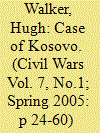

|
|
|
| 20 |
ID:
071457
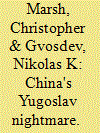

|
|
|
|
|
|
|
|